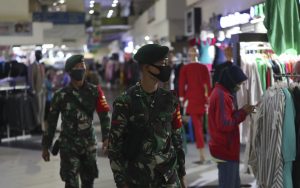The Indonesian archipelago has been slammed by the coronavirus. On July 27, the country crested 100,000 confirmed cases and had suffered 4,838 deaths. In the days ahead of publication, Indonesia was averaging 1,500 new cases per day. In Southeast Asia, Indonesia has the highest number of cases, followed by the Philippines and Singapore. There are reports that the situation could be worse than the numbers show: Testing rates are low and there is a stigma attached to being COVID-19 positive. Indonesia’s health sector, already under strain – with four doctors and 12 hospital beds for every 10,000 people, and only three intensive care beds per 100,000 people – is breaking. In mid July, Indonesia’s top medical bodies announced that 61 doctors had died of COVID-19, 14 doctors that week alone. Meanwhile, 167 nurses had succumbed to the virus.
As Indonesia’s government struggles to contain the pandemic, it has harnessed all state assets including one of the country’s oldest and most trusted institutions: the military.
The conspicuous role of the Indonesian armed forces has drawn attention from commentators and analysts who have questioned whether the country’s response has been overly militarized. Such concerns are raised as part of a broader discussion about democratic decline not just in Indonesia but across Southeast Asia. That said, such generalizations reveal little about how the military is being used in overcoming the current public health crisis in the short to medium term or how this will impact civil-military relations in the long term.
Is the coronavirus actually leading to a military comeback, or is this business as usual?
There is no doubt that the Indonesian military, as well as the police, has had a prominent and wide-reaching role in combatting the coronavirus. The military has been visible from the national level, including figures around President Joko “Jokowi” Widodo, all the way down to uniformed personnel providing assistance at the village level. Key military figures include the controversial health minister, retired Army General Terawan Agus Putranto, known for attributing Indonesia’s low infection rates at the beginning of the pandemic to God, and head of the National Agency for Disaster Prevention (Badan Nasional Penanggulangan Bencana, BNPB), Lieutenant General Doni Monardo, who is also chief of Indonesia’s Coronavirus Disease Response Acceleration Task Force.
As the virus spread, the role of security forces intensified.

































